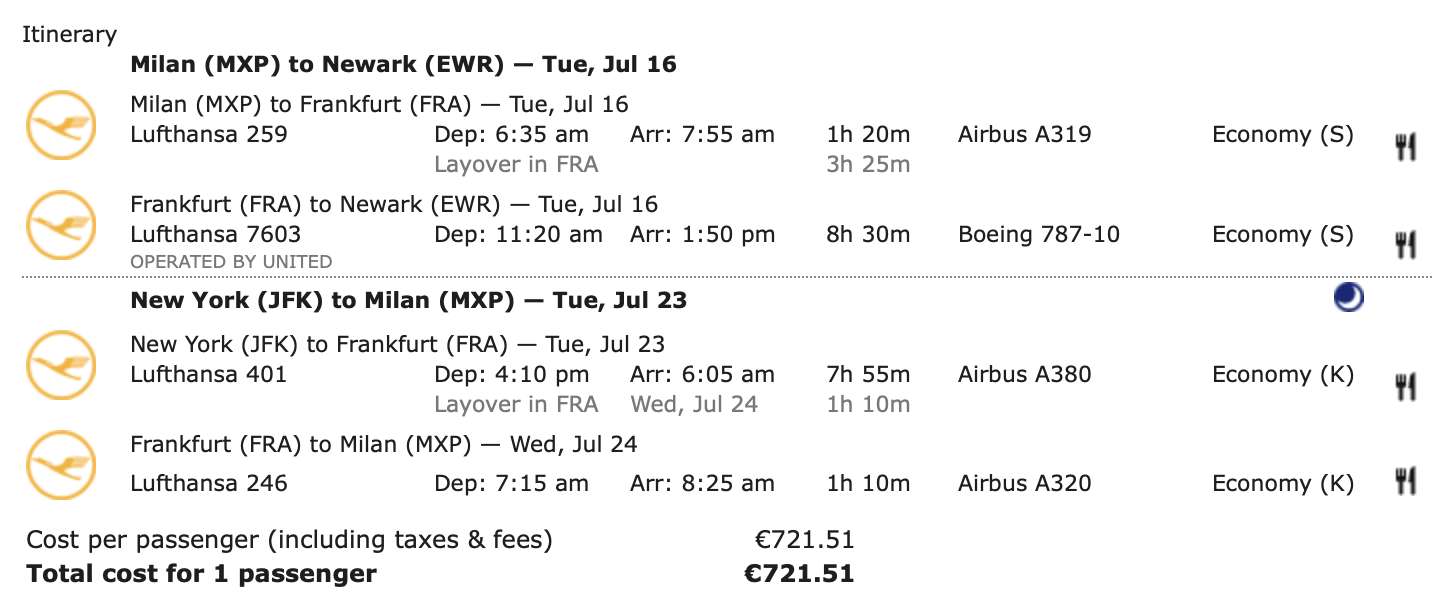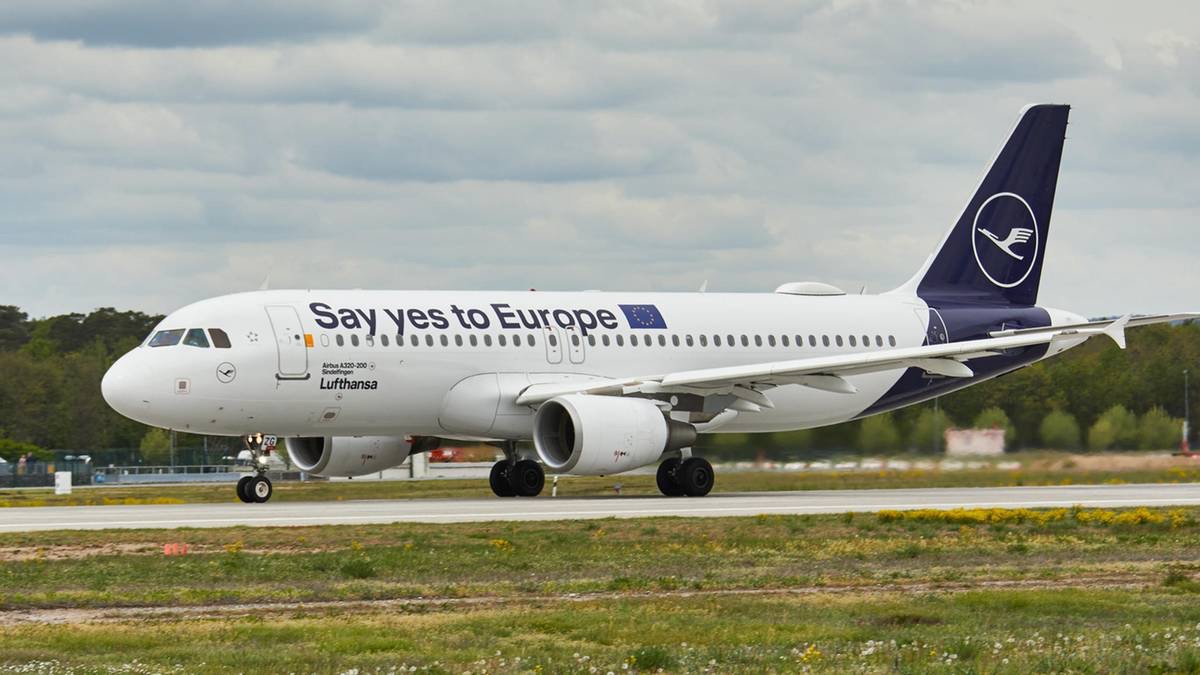What if you could take advantage of Italian law to beat airlines at their own game? The possibilities are fascinating.
In theory, you can book a multi-city airline ticket “in” Italy on any airline, then skip whatever segments you want without ramifications. Practically, you can do this for a number of airlines including Alitalia, Emirates, Lufthansa, and Qatar Airways.
For simplicity, let’s focus on Lufthansa here. As noted by God Save the Points, in 2017 the Italian Competition Authority (AGCM) held that customers were not properly informed of the penalties for missing a flight segment. While legacy carriers will cancel the remainder of your flight segments after missing one, budget carriers like Ryanair allow you to skip a segment and fly the remainder of the itinerary.
This created consumer confusion and Italian authorities determined that airlines like Lufthansa did not clearly reveal to customers the penalties for missing a flight. Rather than just simply require clearer disclosure, the AGCM mandated that airlines allow passengers to skip segments at no cost, as long as they notify the airline in a timely manner.
Thus, Lufthansa now explicitly offers this possibility:
Passengers holding a Lufthansa ticket issued in Italy (via LH.com/IT, LH ticket counter, LH call center or at a travel agency) may use the original booked return flight, out of sequence without recalculation and extra payment, even if the outbound section has not been used. In this case, please call the Lufthansa Customer Relations team latest 24 hours after the planned first ticketed flight segment.
Although Lufthansa tries to couch its policy in “outbound” and “return” language, the Italian regulation actually prescribes that if you skip one segment, further segments cannot be cancelled. That opens up some interesting possibilities.
How This Works In Practice
Airline pricing is rarely correlated to distance flown. A Lufthansa flight from Milan to Frankfurt to New York is often cheaper than a ticket from Frankfurt to New York alone. In some cases, a round-trip ticket from Europe to the United States is cheaper than a one-way ticket from U.S. to Europe.
So think of the possibilities. Say you’re in Frankfurt and want to travel to New York nonstop. Tickets can be pricey during the summer months:

But when you start in Milan, where Lufthansa will offer a far lower price if you are willing to connect in Frankfurt:

Note the flights between Frankfurt and New York above are the same flights and on the same dates in both itineraries. Under Italian law, you can book the second ticket on Lufthansa’s Italian website, skip the Milan to Frankfurt segment, call Lufthansa to let them know, and fly from Frankfurt to New York at a fraction of the cost.
In theory. I just have to add that warning. So often, we see rules and regulations on the book only to see them ignored or openly flouted. Although the AGCM has determined that airlines operating in Europe must abide by these rules, if Lufthansa decides not to abide by them it will be up to consumers to fight back. Most may not consider it worth the effort. I have not tried this “loophole” personally.
I focus on Lufthansa because the German airline made a fool of itself (in my assessment) by suing a passenger in Berlin for essentially do the same thing. Lufthansa lost on procedural grounds, but the idea that airlines can punish consumers for taking advantage of pricing loopholes is a waning legal theory.
> Read More:My Prediction: Lufthansa Hidden City Lawsuit Will Backfire
My example above is draconian, but there are even more draconian examples available. Technically, the ticket does not even have to touch Italy for these rules to apply. Instead, it must simply be booked through an Italian booking channel. Thus, my example above could have been London to Frankfurt to New York or Oslo to Frankfurt to New York.
I strongly doubt this is what the Italian authorities were intending to protect. The AGCM probably thought it was just protecting passengers who only wanted to use the return portion of their one-way ticket. But for better or for worse (and I say better, since only airlines get away with charging more for A than A + B), there are all sorts of arbitrage opportunities with this Italian rule.
Which Airlines Abide By AGCM Ruling
While theoretically this applies to all airlines operating within Italy, American Airlines and British Airways have chosen not to respect the authority’s decree. These carriers risk fine for their actions, but have taken the position that the risk of fine is a better alternative than rolling over to passenger manipulation.
But the following carriers have explicitly said you can skip a segment and call to protect the remainder of the itinerary:
CONCLUSION
I am not necessarily encouraging you to take advantage of this Italian regulation in such an egregious way as my example above. You must consider the risks of doing so. But I do like pointing out these opportunities since airlines, generally speaking, use every trick in the book to punish passengers with strict rules and harsh fees. This just evens the playing field a little bit.
image: Lufthansa





Easy way to get cheap LHR-JFK tickets while also avoiding a good chunk of the UK’s added fees
Not sure how you will avoid fees as they are added if your point of departure is the UK, it doesn’t matter where you buy the ticket.
Interesting about Lufthansa.
I was about to book a ticket with them and knew the price. Just for curiosity I went to LH IT to see if the warning about segements was there and I couldn’t see it anywhere however the same ticket was GBP100 cheaper than on the UK site for exactly the same routing.
I’ll shop around with LH a bit more in future!
I’ve often wondered if it would be possible (and successful) to request a chargeback in the event an airline didn’t comply with just such a ruling. Of course, this creates work for the issuing bank, but if you have the legal proof that the airline failed to comply, that should be enough. I think the same for when airlines breach the contract of carriage, even though it’s written in their favor. Especially with the US3 having a love affair with claiming weather as the factor no matter how obtuse. Would love to hear some ideas on this and what kind of unintended side effects we’d perhaps see.
This is something that somebody needs to drag up to the European level and produce a European court ruling, so there can be consistency across the European Single Market — and I’m cautiously optimistic that the European Court of Justice would rule it’s legal to skip a segment. Your thoughts?
Makes good sense. In almost any other industry customers can play the arbitrage game. I see frequently good prices out of MXP like the KLM flight MXP-AMS-HAV. Easy to skip the first segment then.
So why don’t you be the Guinea pig and do this with AA or BA and take them to court when they cancel the rest of your itinerary. Get some precedent law on the books. That would be an amazing series of blog posts and a service to all passengers.
Hmm so if there is a good sale out of IT to USA (or elsewhere) could nest to 2 F class tickets (or Y out/A in) ,skip the EU to USA legs and just run F from USA-EU?
Of course this would oy work on some uke fares and deals, but interesting proposition.
That could absolutely work, in theory at least!
Matthew,what you are saying is go ahead and break a contract with out penalty !
Even if I don agree what the rules of the airlines,a contract is a contract! when you buy your tkt you agree to go from point A to C stoping in B ,that is what you are agree to do ,airlines calculate and sell the tkts acordly !
I’m just sharing what Italian law allows.
Hi Matthew,
FYI i tried this with BA (even though officially they don’t abide by this ruling) on a ticket that started in Milan-London-NYC.
I called them to ask them to cut off first leg. They said that the AGCM ruling only applies to the return leg. ie on my flight the return flight back from NYC-LON-MI, and that if i would miss the MIL-LON leg that would automatically cancel the onward LON-NYC. They will consider MIL-LON-NYC all as one leg!
Its interesting for two reasons.
Firstly it seems like they were prepared to abide by the ruling, And secondly they seem to say that that the ruling only applies to a “return” portion of the trip, even if the trip is a multi city itinerary.
Wanted to share my findings with you and ask for your thoughts.
Hi Martin, thanks for this valuable data point. That’s an interesting interpretation of the rule and seems to be how Lufthansa interprets it as well. Hopefully others will also comment on their experiences.
I can see why airlines would try to interpret the rule in this way, though I’m not sure that is what Italy intended.
Etihad now allows this as well, but their terms and conditions explictly statee the gap between the missed flight and the next flight must be at least 12 hours.
Hey Matthew,
I read about that rule in 2019 already, but never used it.
Reading your post again now, I checked the terms and conditions of Lufthansa which you linked.
Within those I could not find that Lufthansa states in the conditions that it would apply to those rules.
In 3.3.3 I rather find the following:
3.3.3. If you have chosen a tariff that requires observance of a fixed ticket sequence, please note: if carriage is not used on all individual legs or not used in the sequence specified on the ticket with otherwise unchanged travel data, we will recalculate the airfare according to your altered routing. The airfare will thereby be determined in accordance with the fare you would have had to pay for your actual routing in your price group on the day of your booking. This fare may be higher or lower than the fare you originally paid.
If the price group you originally booked was not available for the altered routing on the day of the booking, the cheapest available former price group for your altered routing will be taken as the basis for the recalculation.
Is it still up to date that they stick with the Italian court ruling?
Also the spanish court had a similar ruling.
The German court ruling seems to not allow this practice as well, but I think the Italien ruling ist stronger.
Which of the 3 rulings would you concider more strong?
A comparison might be an interesting article if you feel you have time and motivation for that 🙂
All best from Germany and a happy stay here
Sebasitan